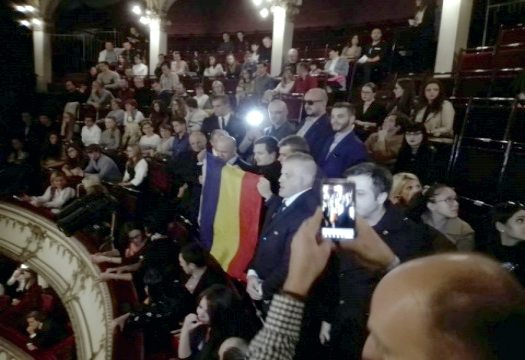by ActiveNews.ro:
At the National Opera in Cluj Napoca, Romania, a concert that included an imam performing the Muslim call to prayer was interrupted by people singing the national anthem. Five people were peacefully escorted out and fined by the local police. Codrin Goia, one of the people escorted out, declared:“Yesterday, October 1, 2017, a multicultural piece was held at the National Opera in Cluj. This concert was supposed to bring a message of peace, but I heard with a group of friends, a group of nationalists from here in Cluj, members of the New Right party, that a Muslim imam would scream “Allahu Akbar”, the same chant all the terrorists who commit attacks and murders scream. Ironically, on that same day, in Marseilles, France, two women were stabbed and killed by a terrorist who yelled out the same thing. We went to that piece to see what that was all about.“It did not take ten minutes, and there was a character on the stage who started shouting “Allahu Akbar!” Obviously, in a Romanian city, a Christian city such as Cluj Napoca, that did not seem acceptable to us, and we started to sing the national anthem. Some waved the national flag. It was a reaction, because the national anthem is also a call to awaken, to rise up, to action. We see this as a play to brainwash viewers, so people might easily accept the Islamization of Romania. This is a problem not only for Romania, but for all of Europe, and the Romanians are being forced by the EU to take in as many refugees as possible. And these people will not come here to be hard workers and bring a benefit to society.”
The “duel” at the Romanian opera is one hopeful sign. Another, more significant sign is the recent gathering of hundreds of thousands of Catholics along the Polish border to pray the rosary.
The “Rosary at the Borders” event brought Catholics to locations around the country’s 2,000 miles of borders, around its Baltic Coastline, and to its major airports. By some estimates as many as 1.5 million participated. The event took place on October 7, the Feast of Our Lady of the Rosary. That day was also the 446th anniversary of the decisive naval victory at Lepanto. Under the leadership of the Holy League, the Catholic fleet defeated the larger Ottoman fleet and saved Europe from an Islamic invasion. Pope Pius V who had called for Catholics to say the rosary in support of the fleet, credited the victory to Mary’s intercession, and established October 7 as the feast of Our Lady of the Rosary.
In a commentary on G.K. Chesterton’s poem, “Lepanto,” Brandon Rogers wrote of Pope Pius V:
[He] understood the tremendous importance of resisting the aggressive expansion of the Turks better than any of his contemporaries appear to have. He understood that the real battle being fought was spiritual; a clash of creeds was at hand, and the stakes were the very existence of the Christian West.
The existence of the Christian West is once again at stake. Eastern Europeans understand this better than most. And as exemplified by the “Rosary at the Borders,” they understand, as did Pius V, that the conflict with Islam is a spiritual battle.
Another Eastern European who grasps what is at stake is Prime Minister Victor Orban of Hungary. Orban echoes one of the main themes in the writings of Pope Benedict XVI—namely, that Europe has Christian roots, and if it cuts itself off from those roots, it will lose not only its identity, but also its greatness and goodness.
In a number of speeches, Orban has raised the question of whether Christianity can survive in Europe if Europe keeps its borders open to the “Great Migration” from cultures that are hostile to Christianity and Judaism. He has made the case that this migration jeopardizes freedom of religion, equality between men and women, and the fight against anti-Semitism. “Our guiding idea,” he says, “is not liberalism, but sovereignty and Christian social teachings.”
Something is stirring in Eastern Europe. There are numerous signs that a resistance is building against both the soft tyranny of the EU, and the hard tyranny of Islam which is being imported by the EU elites. This spirit of resistance is slowly seeping into Western Europe where polls show that a majority of citizens now want a complete and permanent halt to Muslim migration. It’s also reflected in the fact that the PEGIDA movement (Patriotic Europeans against the Islamization of Europe), which began in Eastern Germany, has now spread to all of Western Europe. Eastern European resistance may have helped inspire Eurosceptic and anti-immigrant parties that won majorities in Austrian elections this weekend.
During the Cold War, Western Europeans supplied aid and encouragement to their brethren behind the Iron Curtain. Now it looks as though the East is returning the favor.
